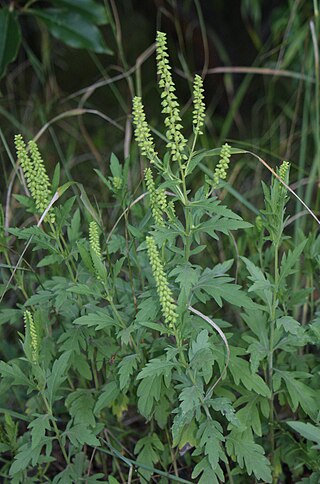Further reading
- "Hay-Fever Weeds and How They May be Recognized". California State Journal of Medicine. 14 (6): 257–258. 1916. PMC 1642239 . PMID 18737013.
Hay fever weed may refer to:

In the ancient Greek myths, ambrosia is the food or drink of the Greek gods, and is often depicted as conferring longevity or immortality upon whoever consumed it. It was brought to the gods in Olympus by doves and served either by Hebe or by Ganymede at the heavenly feast.
English usually refers to:
Souma may refer to:

Ragweeds are flowering plants in the genus Ambrosia in the aster family, Asteraceae. They are distributed in the tropical and subtropical regions of the Americas, especially North America, where the origin and center of diversity of the genus are in the southwestern United States and northwestern Mexico. Several species have been introduced to the Old World and some have naturalized and have become invasive species. In Europe, this spread is expected to continue, due to ongoing climate change.

Allergic rhinitis, of which the seasonal type is called hay fever, is a type of inflammation in the nose that occurs when the immune system overreacts to allergens in the air. Signs and symptoms include a runny or stuffy nose, sneezing, red, itchy, and watery eyes, and swelling around the eyes. The fluid from the nose is usually clear. Symptom onset is often within minutes following allergen exposure, and can affect sleep and the ability to work or study. Some people may develop symptoms only during specific times of the year, often as a result of pollen exposure. Many people with allergic rhinitis also have asthma, allergic conjunctivitis, or atopic dermatitis.

Hay Fever is a comic play written by Noël Coward in 1924. Its first production was in the West End in 1925 with Marie Tempest as Judith Bliss. A cross between high farce and a comedy of manners, the play is set in an English country house in the 1920s, and deals with the four eccentric members of the Bliss family and their outlandish behaviour when they each invite a guest to spend the weekend. The self-centred behaviour of the hosts finally drives their guests to flee while the Blisses are so engaged in a family row that they do not notice their guests' furtive departure.
Cythera may refer to:
Ambrosia is the food of the gods of Greek mythology.

Ambrosia is an American rock band formed in Los Angeles in 1970. Ambrosia had five Top 40 hit singles released between 1975 and 1980, including the Top 5 hits "How Much I Feel" and "Biggest Part of Me", and Top 20 hits "You're the Only Woman " and "Holdin' on to Yesterday". Most of the original band members have been active with the group continuously since their 1989 reformation to the present day, with the notable exception of original guitarist and lead vocalist David Pack who left in 2000.

Ambrosia artemisiifolia, with the common names common ragweed, annual ragweed, and low ragweed, is a species of the genus Ambrosia native to regions of the Americas.
Wild tansy is a common name for several plants. Wild tansy may refer to:

Ambrosia trifida, the giant ragweed, is a species of flowering plant in the family Asteraceae. It is native to North America, where it is widespread in Canada, the United States, and northern Mexico.
Part of Me or A Part of Me may refer to:
Bitterweed may refer to:
Roman wormwood is a common name for several plants and may refer to:
Barracks are buildings built to house military personnel or laborers.
Sorrel, Rumex acetosa, is a perennial herb cultivated as a leaf vegetable.
180 is a year.
Christopher North may refer to:
Hay fever is an inflammatory reaction to allergens in the air.